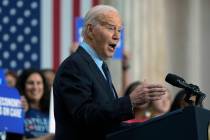No UMC subsidies without openness
The Clark County Commission serves as the board of directors of University Medical Center. Some commissioners admit they have no expertise in running a hospital, so a proposal to set up an independent UMC board comes as no surprise. It may even have merit.
What's of concern is the possibility that this board would conduct its financial affairs largely in secret while continuing to accept tens of millions of dollars in taxpayer subsidies.
Under a plan county commissioners will consider Dec. 5, previously available hospital records could become exempt from the state's public records law. Contracts with doctors and companies, the names of hospital employees - nearly everything outside the hospital's annual financial report - could be private. Even the hospital's board meetings - except for one a year "to report on the affairs of the corporation" - would be closed to the public.
County commissioners would need permission from the state Legislature to turn things over to such a full-time board.
"I don't like it," says Commissioner Lawrence Weekly, current chairman of the hospital's board of trustees.
Commissioner Steve Sisolak agrees, asking, "How do you not let the public know how you're spending their money?"
UMC provides roughly $250 million in uncompensated care every year and makes enough money to cover all but $60 million to $70 million of those losses. The county has been paying the difference.
Advocates for the governance change include the hospital's CEO, Brian Brannman, who contends he needs to make important decisions in private so competitors can't undercut him.
"I understand what Brian is saying," Mr. Sisolak responded. "At the same time, these contracts have got to be public."
Mr. Sisolak warned such secrecy could create an environment ripe for nepotism and inside dealings. That's not a mere hypothetical. In early 2007, UMC CEO Lacy Thomas was fired by then-County Manager Virginia Valentine. Police revealed he was under criminal investigation, and outside auditors reported the public hospital lost $34.3 million the previous year, nearly twice the figure he'd given Clark County commissioners just months prior.
A grand jury indicted Thomas in February 2008 on 10 counts after prosecutors alleged he steered $10 million in no-work contracts to his Chicago friends. But the case ended in a mistrial last year when investigators failed to share evidence with defense lawyers as required, and Judge Michael Villani then dismissed the case, calling the indictment "unconstitutionally vague." Prosecutors have appealed.
Mr. Weekly says that as long as UMC takes taxpayer money, its financial affairs should be transparent. He's right.
The underlying problem is how to cover the losses that are inevitable when a tax-subsidized public hospital offers state-of-the-art treatment to the indigent. Commissioners have discussed billing other municipalities for treatment of their residents. That - and more aggressive pursuit of payment from those not truly impoverished - may be necessary. But those are separate issues.
Executives do work at a disadvantage when competitors have advance access to their pricing and marketing strategies. More competitive price-shopping by medical consumers could do wonders in holding down costs, but we're not there yet, as any consumer can learn by trying to get a price, in advance, for something as simple as an appendectomy.
Transfer of actual ownership of the hospital to a nonprofit corporation could be a different matter. But the county would doubtless seek a guarantee of continued services, in exchange for which the new owners would demand ongoing subsidies.
"I just don't see the benefit for the public" in allowing the board of a tax-subsidized hospital to meet behind closed doors, Commissioner Chris Giunchigliani said last week.
Some compromise may be possible. But blanket financial secrecy? Try again.

















